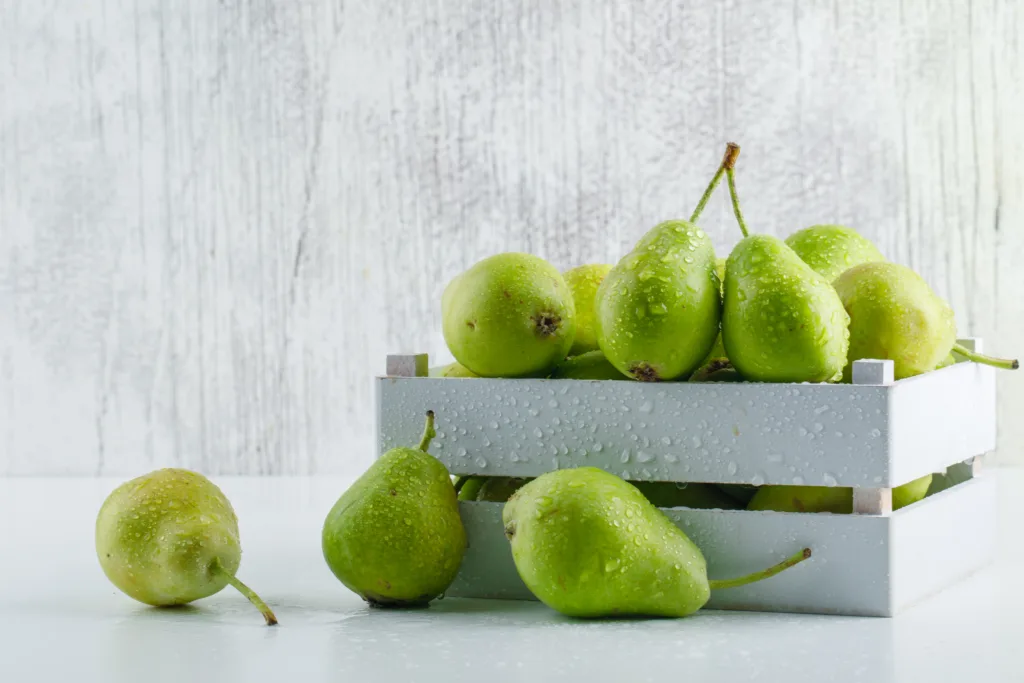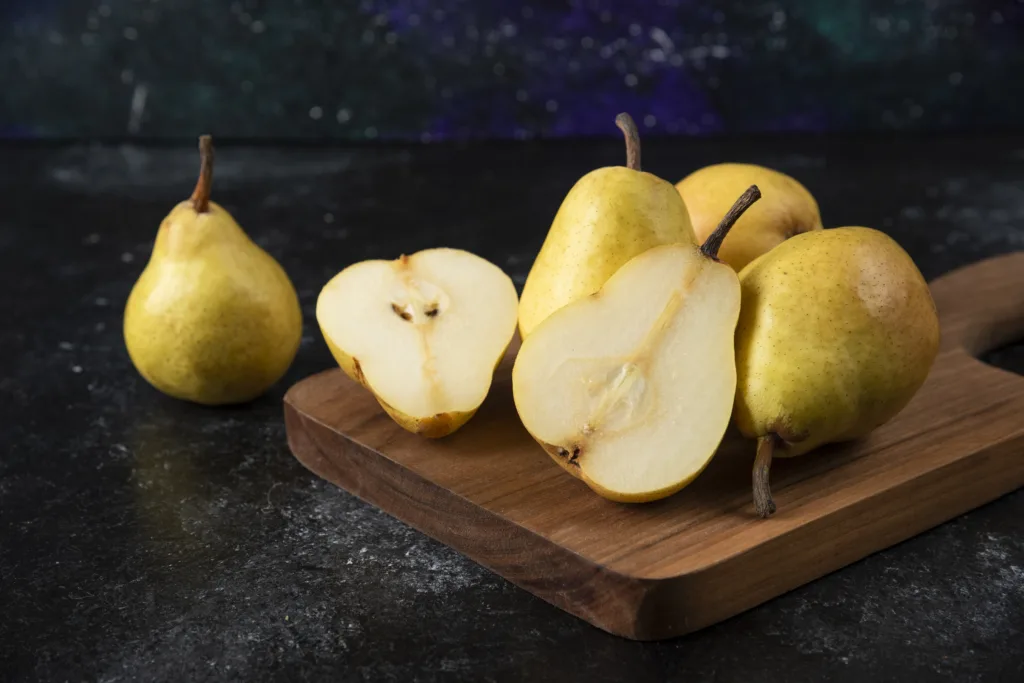Pears are not just delicious fruits; they are also packed with essential nutrients that contribute to overall health and well-being. From promoting digestion to boosting heart health, pears offer a plethora of benefits that make them a valuable addition to any diet. In this article, we will delve into the various health benefits of pears, backed by scientific evidence, to highlight why you should include this fruit in your daily nutrition.

Nutritional Profile of Pears
Before exploring the health benefits of pears, let’s take a closer look at their nutritional composition. Pears are rich in dietary fiber, vitamins, and minerals while being low in calories, making them an ideal choice for those aiming for a balanced diet.
- Fiber: Pears are an excellent source of dietary fiber, with one medium-sized pear providing about 6 grams of fiber. Fiber is crucial for digestive health as it promotes regular bowel movements and helps prevent constipation.
- Vitamins: Pears are rich in vitamin C, an antioxidant that supports the immune system and promotes skin health. They also contain vitamin K, which plays a role in blood clotting and bone health.
- Minerals: Pears contain minerals such as potassium, which is essential for maintaining healthy blood pressure levels, and copper, which supports nerve function and helps form red blood cells.
Health Benefits of Pears
- Promotes Digestive Health
Pears are a great source of dietary fiber, including both soluble and insoluble fiber. Soluble fiber helps regulate blood sugar levels and lowers cholesterol, while insoluble fiber adds bulk to the stool, promoting regular bowel movements and preventing constipation. Including pears in your diet can contribute to a healthy digestive system and reduce the risk of gastrointestinal disorders. - Supports Heart Health
The fiber, potassium, and antioxidants found in pears offer significant benefits for heart health. Potassium helps regulate blood pressure by counteracting the effects of sodium, while fiber helps lower cholesterol levels, reducing the risk of heart disease. Additionally, the antioxidants in pears help combat inflammation and oxidative stress, which are factors contributing to heart disease. - Aids Weight Management
Pears are low in calories and high in fiber, making them an excellent choice for those looking to manage their weight. The fiber content in pears helps promote satiety, keeping you feeling full for longer periods and reducing overall calorie intake. Additionally, the natural sugars in pears provide a sweet taste without the need for added sugars, making them a healthy alternative to high-calorie snacks. - Boosts Immune Function
Pears are rich in vitamin C, a powerful antioxidant that supports immune function by protecting cells from damage caused by free radicals. A strong immune system is essential for fighting off infections and illnesses, making pears a valuable addition to your diet, especially during cold and flu season. - Promotes Skin Health
The vitamin C content in pears plays a crucial role in collagen production, a protein that supports skin structure and elasticity. Collagen helps keep the skin firm and youthful-looking while also promoting wound healing. Including pears in your diet can contribute to healthy, glowing skin from the inside out. - Supports Bone Health
Pears contain vitamin K, which is essential for bone health as it helps regulate calcium absorption and supports bone mineralization. Adequate vitamin K intake is associated with a lower risk of osteoporosis and fractures, making pears a valuable addition to a bone-healthy diet.

How to Incorporate Pears into Your Diet
Now that we’ve explored the numerous health benefits of pears, you may be wondering how to incorporate this nutritious fruit into your daily diet. Here are some simple and delicious ways to enjoy pears:
- Fresh Pear Slices: Enjoy sliced pears as a snack on their own or pair them with a serving of cheese for a satisfying and nutritious snack.
- Pear Salad: Add sliced pears to your favorite salad for a refreshing burst of sweetness and extra fiber.
- Pear Smoothie: Blend ripe pears with Greek yogurt, spinach, and a splash of almond milk for a nutritious and energizing smoothie.
- Baked Pears: Core pears and fill them with a mixture of oats, nuts, honey, and cinnamon, then bake until tender for a healthy dessert option.
- Pear Sauce: Cook diced pears with a splash of water and a pinch of cinnamon until soft, then puree until smooth for a delicious pear sauce that can be used as a topping for oatmeal or yogurt.
Conclusion
Pears are not only delicious but also incredibly nutritious, offering a wide range of health benefits. From promoting digestive health to supporting heart health and boosting immune function, pears are a valuable addition to any diet. With their versatility and sweet flavor, pears can be enjoyed in a variety of ways, making it easy to incorporate them into your daily meals. So next time you’re at the grocery store, be sure to pick up some pears and reap the numerous health rewards this fruit has to offer.
Topics covered:
- What are pears?
- What are the nutrition in pears?
- What is nutritional profile of pears?
- What are uses of pears?
- Recipes of pears.
- How to use pears.







Hey there, I appreciate you posting great content covering that topic with full attention to details and providing updated data. I believe it is my turn to give back, check out my website QH9 for additional resources about Airport Transfer.